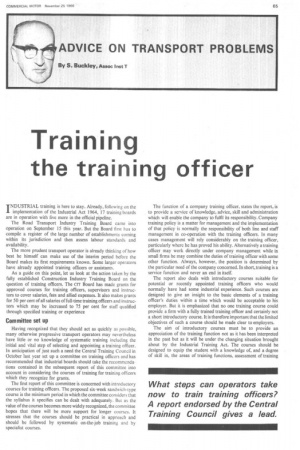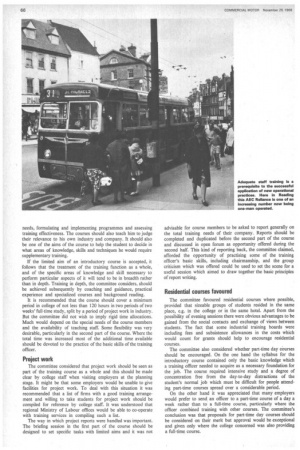Training
Page 67

Page 68

If you've noticed an error in this article please click here to report it so we can fix it.
the training officer
INDUSTRIAL training is here to stay. Already, following on the implementation of the Industrial Act 1964, 17 training boards are in operation with five more in the official pipeline.
The Road Transport Industry Training Board came into operation on September IS this year. But the Board first has to compile a register of the large number of establishments coming within its jurisdiction and then assess labour standards and availability.
The more prudent transport operator is already thinking of how best he himself can make use of the interim period before the Board makes its first requirements known. Some larger operators have already appointed training officers or assistants.
As a guide on this point, let us look at the action taken by the fully established Construction Industry Training Board on the question of training officers. The CIT Board has made grants for approved courses for training officers, supervisors and instructors to cover salaries, fees and allied expenses. It also makes grants for 50 per cent of all salaries of full-time training officers and instructors which may be increased to 75 per cent for staff qualified through specified training or experience Committee set up Having recognized that they should act as quickly as possible, many otherwise progressive transport operators may nevertheless have little or no knowledge of systematic training including the initial and vital step of selecting and appointing a training officer. In anticipation of just such a need the Central Training Council in October last year set up a committee on training officers and has recommended that industrial hoards should take the recommendations contained in the subsequent report of this committee into account in considering the courses of training for training officers which they recognize for grants.
The first report of this committee is concerned with introductory courses for training officers. The proposed six-week sandwich-type course is the minimum period in which the committee considers that the syllabus it specifies can be dealt with adequately. But as the value of the courses becomes more widely recognized, the committee hopes that there will be mote support for longer courses. It stresses that the courses should be practical in approach and should be followed by systematic on-the-job training and by specialist courses. The function of a company training officer, states the report, is to provide a service of knowledge, advice, skill and administration which will enable the company to fulfil its responsibility. Company training policy is a matter for management and the implementation of that policy is normally the responsibility of both line and staff management in co-operation with the training officers. In many cases management will rely considerably on the training officer, particularly where he has proved his ability. Alternatively a training officer may work directly under company management while in small firms he may combine the duties of training officer with some other function. Always, however, the position is determined by the particular need of the company concerned. In short, training is a service function and never an end in itself.
The report also deals with introductory courses suitable for potential or recently appointed training officers who would normally have had some industrial experience. Such courses are designed to give an insight to the basic elements of a training officer's duties within a time which would be acceptable to his employer. But it is emphasized that no one training course could provide a firm with a fully trained training officer and certainly not a short introductory course. It is therefore important that the limited objectives of such a course should be made clear to employers.
The aim of introductory courses must be to provide an appreciation of the training function not as it has been interpreted in the past but as it will be under the changing situation brought about by the Industrial Training Act. The courses should be designed to equip the student with a knowledge of, and a degree of skill in, the areas of training functions, assessment of training needs, formulating and implementing programmes and assessing training effectiveness. The courses should also teach him to judge their relevance to his own industry and company. It should also be one of the aims of the course to help the student to decide in what areas of knowledge, skills and techniques he would require supplementary training.
If the limited aim of an introductory course is accepted, it follows that the treatment of the training function as a whole, and of the specific areas of knowledge and skill necessary to perform particular aspects of it will tend to be in breadth rather than in depth. Training in depth, the committee considers, should be achieved subsequently by coaching and guidance, practical experience and specialized courses and background reading.
It is recommended that the course should cover a minimum period in college of not less than 120 hours in two periods of two weeks' full-time study, split by a period of project work in industry. But the committee did not wish to imply rigid time allocations. Much would depend on the special needs of the course members and the availability of teaching staff. Some flexibility was very desirable, particularly in the second part of the course. Where the total time was increased most of the additional time available should be devoted to the practice of the basic skills of the training officer.
Project work
The committee considered that project work should be seen as part of the training course as a whole and this should be made clear by college staff when visiting employers at the planning stage. It might be that some employers would be unable to give facilities for project work. To deal with this situation it was recommended that a list of firms with a good training arrangement and willing to take students for project work should be compiled for reference by college staff. It was understood that regional Ministry of Labour offices would be able to co-operate with training services in compiling such a list.
The way in which project reports were handled was important. The briefing session in the first part of the course should be designed to set specific tasks with limited aims and it was not advisable for course members to be asked to report generally on the total training needs of their company. Reports should be completed and duplicated before the second part of the course and discussed in open forum as opportunity offered during the second half. This kind of reporting back, the committee claimed, afforded the opportunity of practising some of the training officer's basic skills, including chairmanship, and the group criticism which was offered could be used to set the scene for a useful session which aimed to draw together the basic principles of report writing.
Residential courses favoured
The committee favoured residential courses where possible, provided that sizeable groups of students resided in the same place, e.g. in the college or in the same hotel. Apart from the possibility of evening sessions there were obvious advantages to be gained from the social contacts and exchange of views between students. The fact that some industrial training boards were including fees and subsistence allowances in the costs which would count for grants should help to encourage residential courses.
The committee also considered whether part-time day courses should be encouraged. On the one hand the syllabus for the introductory course contained only the basic knowledge which a training officer needed to acquire as a necessary foundation for the job. The course required intensive study and a degree of concentration free from the day-to-day distractions of the student's normal job which must be difficult for people attending part-time courses spread over a considerable period.
On the other hand it was appreciated that many employers would prefer to send an officer to a part-time course of a day a week rather than to a full-time course, particularly where the officer combined training with other courses. The committee's conclusion was that proposals for part-time day courses should be considered on their merit but approval would be exceptional and given only where the college concerned was also providing a full-time course.












































































































